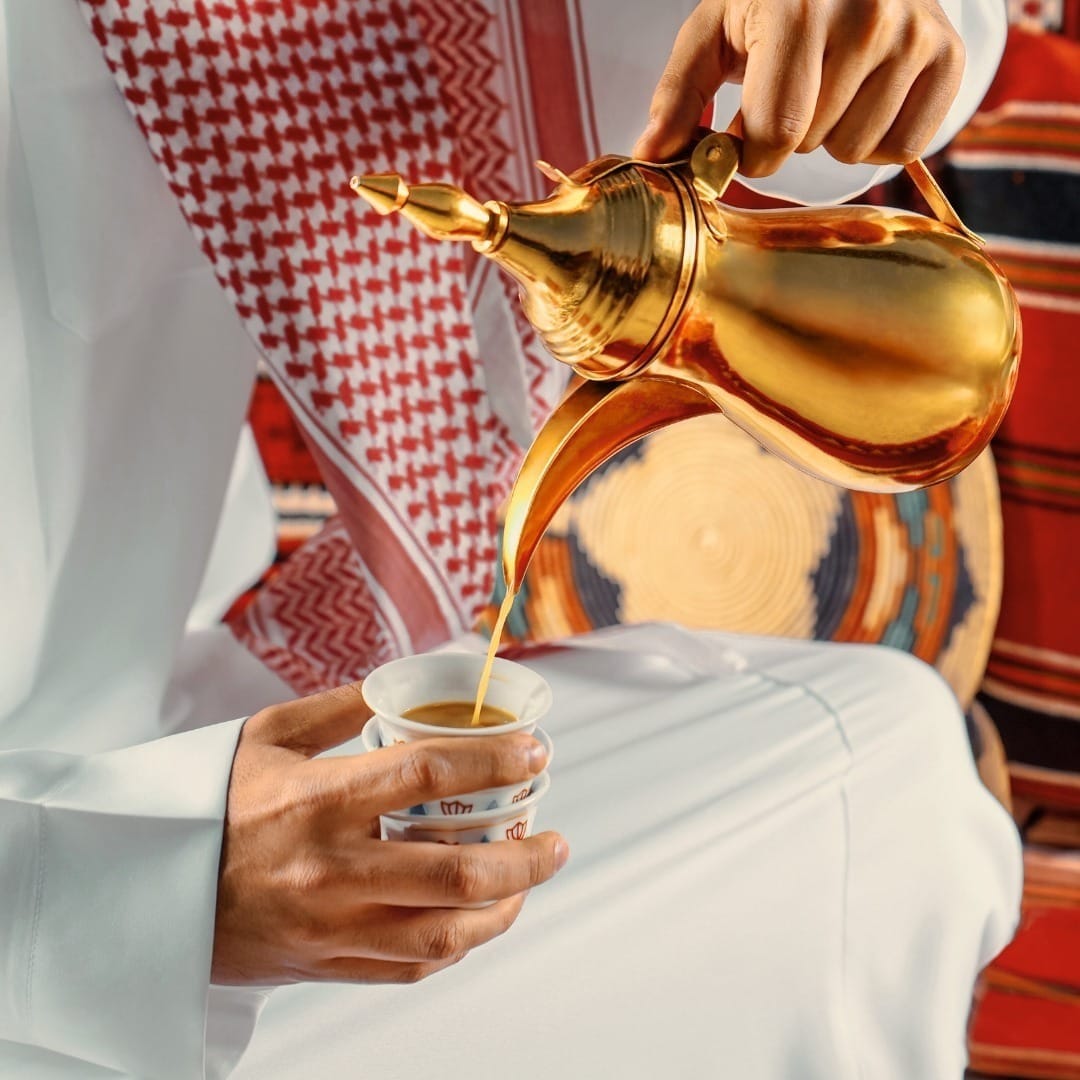An Intimate Look at Qahwa, Etiquette, Tools, and the Soul of Saudi Hospitality
More Than a Drink, a Dialogue
In Saudi Arabia, coffee isn’t a beverage. It’s a gesture, a language, a ritual of belonging.
Known locally as qahwa (قهوة سعودية), Saudi coffee is greenish-gold, spiced with cardamom and often served with dates. But its importance goes far beyond taste. It is a cornerstone of Saudi identity — especially when it comes to hospitality, respect, and human connection.
To be offered qahwa is to be welcomed, not just into a home, but into someone’s heart.
What Is Qahwa? The Flavor of a Region
Unlike dark roasted espresso-style coffee, Saudi qahwa is made using lightly roasted Arabica beans, boiled with:
- Cardamom (the star of the flavor)
- Saffron (for color and aroma, especially in the Hejaz and Eastern regions)
- Cloves or cinnamon (in some regions)
- Sometimes rosewater or ginger
Each region prepares qahwa differently, but it’s always light, aromatic, and served without sugar — dates or sweets are offered alongside instead.
Tools of the Tradition: A Cultural Set
A true Saudi coffee ceremony is built around essential elements:
1. Dallah (دلة)
The elegant coffee pot, often gold or silver, symbolizing hospitality itself. The way it’s held, poured, and passed is ritualized.
2. Finjal (فنجان)
A small handleless cup used for serving. Typically, guests receive three small pours — never filled to the top. One sip is respectful. Three sips is ideal. Finishing the cup and handing it back means “I’ve had enough.”
3. Mehmas (محمصة) & Mahmas (مهماس)
Traditional roasting tools — the pan and stirrer used to roast beans over fire. Though now mostly symbolic, they represent pride in preparation.
4. Dates & Sweets (تمر وحلا)
No qahwa is complete without a side of dates — sometimes served with ghee, tahini, or nuts, depending on the region.
The Ceremony: Etiquette of Honor
Serving Saudi coffee isn’t just functional — it’s deeply performative and symbolic.
☕ Hosting Rules:
- The youngest male usually serves elders and guests.
- The right hand only is used to pour and receive.
- The host stands while pouring — a sign of humility and service.
- Guests should accept the cup with the right hand and nod politely before sipping.
- To say “no more,” gently shake the cup when returning it.
This ritual isn’t about caffeine. It’s about code, character, and connection.
More Than a Drink: What Qahwa Reveals
The Saudi coffee ceremony speaks volumes — without a single word:
| What Happens | What It Means |
|---|---|
| First cup | You're welcome here |
| Second cup | You’re honored here |
| Third cup | You are respected as family |
| Pouring without asking | I know what you need |
| Refusing more | I accept your generosity |
It’s not about the coffee — it’s about reading the room, showing respect, and upholding generational traditions.
Regional Differences: One Qahwa, Many Interpretations
Each part of Saudi Arabia adds its own personality to the ritual:
- Najd: Classic and strong with heavy cardamom. The ceremony is formal, often accompanied by poetry.
- Hijaz: Light and infused with saffron or rose. Poured with elegance, served with sweets like maamoul.
- Asir & Jazan: Earthy qahwa, sometimes with local herbs. Known for more intimate and musical gatherings.
- Eastern Province: Influenced by the Gulf — often includes cloves or ginger, and served with mixed nuts.
Modern Revival: A Cultural Renaissance in a Cup
Saudi coffee is undergoing a renaissance. Thanks to Vision 2030’s focus on cultural heritage, qahwa is now:
- Featured in tourism experiences and restaurants
- Promoted by the Ministry of Culture as a national symbol (2022 was the Year of Saudi Coffee)
- Central to branding Saudi Arabia’s soft power internationally
- Inspiring modern interpretations, like qahwa mocktails and coffee-scented perfumes
From homes to cafes to embassies abroad, qahwa is Saudi Arabia’s aromatic ambassador.
The Cup That Connects Us
Qahwa isn’t just part of Saudi culture — it is Saudi culture, distilled in a warm, golden cup.
It’s how we:
- Welcome a stranger
- Honor a guest
- Bridge generations
- Carry on our values
So next time someone pours you a cup, don’t just taste the coffee.
Feel the history, intention, and humanity behind it.
Because in every dallah, there’s a story.
And in every sip — a bond.
